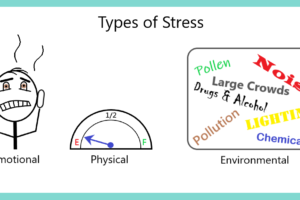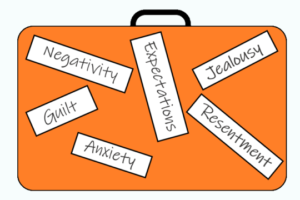
What Are Defense Mechanisms?
Defense mechanisms are your unconscious thoughts that provide you with emotional distance from your unpleasant feelings. For example, if you are confronted by an uncomfortable situation, instead of directly facing that situation, you may use a defense mechanism to protect yourself from emotional harm.
Defense mechanisms are a normal, natural part of psychological development. They can be both positive (helpful) and negative (detrimental). There are events that may be so traumatic, they cannot be managed at the time the event occurs, for example, child abuse or learning of the death of a family member or friend.
One of the problems with using defense mechanisms on a regular basis, or on a long term basis, is that they can hold you back from facing reality. This can easily happen because defense mechanisms are unconscious; you may not even realize you are using them!
Defense mechanisms are tactics learned in childhood. This is great news! Because any behavior that is learned can be unlearned and relearned in a different way! This is the concept of RelationshipsRelearned.com
Many defense mechanisms have become a common part of your everyday language. For example, when someone doesn’t want to face a problem, you might describe them as being “in denial”. If someone has a temper tantrum, you are likely to say that person is “regressing” (to an earlier stage of development).
While there are many, many defense mechanisms, some are more common than others. The following are 12 of the more common defense mechanisms.
Common Defense Mechanisms
- Acting Out
Acting out is coping with stress by engaging in a physical action rather than acknowledging feelings. It may be throwing things, breaking things and/or “verbal vomiting”. The old adage, “the best defense is a good offense”, applies here.
Example: Instead of saying, “I’m angry with you,” you act out by throwing a book or punching a hole through a wall. PhychCentral – 15 Common Defense Mechanisms
- Compensation
No one can be good at everything. The defense mechanism of compensation is emphasizing or overachieving in one area of life to make up for some perceived deficiency in another area.
Example: “I may not know how to cook, but I can clean!” is an example of compensating for a lack of cooking skills by emphasizing your cleaning skills.
- Denial
Denial occurs when you refuse to accept reality or facts. You block external events or circumstances from your mind so that you don’t have to deal with the emotional impact. You avoid the painful feelings or events. Healthline – Top 10 Defense Mechanisms and Why We Use Them
Example: You have a drug or alcohol addiction but deny that you have a problem, pointing to how well you function in your job and maintain relationships.
- Displacement
Displacement involves taking out frustrations and feelings on people or objects that are less threatening. Directing your frustrations towards a less threatening person allows you to satisfy your impulse without serious consequences.
Example: You have a really bad day at work but don’t address the issue with your boss. Instead, on your way home from work you take out your frustration on the convenience store associate, or you wait until you get home and take your frustration out on your family.
- Intellectualization
This defense mechanism allows you to avoid thinking and feeling about the stressful, emotional aspect of a situation. Instead of focusing on the stressful situation, the focus is on the cold, clinical intellectual component.
Example: You have just received a diagnosis of terminal cancer. You focus on potential surgeries and experimental new drugs instead of expressing your fear, sadness and grief.
- Projection
Projection is when you put your thoughts or feelings onto another person, as though they were the other person’s thoughts and feelings. Projection is often the result of a lack of insight and acknowledgement of your own motivations and feelings.
Example: You are a messy person who doesn’t pick up after yourself, but you accuse your partner of being the messy person in the relationship. Psychology Today – Defense Mechanisms
- Rationalization
Rationalization is inventing an acceptable excuse for your thoughts, feelings and behavior. It is an attempt to explain undesirable behaviors with your own “facts.” It allows you to feel comfortable with the choice you made, even if you know it’s not right.
Example: As a college student, you might blame a poor exam score on the instructor rather than your own lack of preparation.
- Reaction Formation
People who use this defense mechanism recognize how they feel, but they behave in the opposite manner. A person may feel they should not express negative emotions, such as anger or frustration. They choose to instead react in an overly positive way.
Example: Treating someone you strongly dislike in an excessively friendly manner in order to hide your true feelings.
- Regression
Some people who feel threatened or anxious may unconsciously “escape” to an earlier stage of development. When confronted by stressful events, people sometimes revert to patterns of behavior used earlier in development.
Example: You become fixated at an earlier developmental stage, maybe crying or sulking or throwing a “temper tantrum” upon hearing unpleasant news.
- Repression
Repression is the unconscious blocking of painful memories. Instead of facing them, you may unconsciously choose to hide them in hopes of forgetting about them entirely. The key to repression is that people do it unconsciously, so they often have very little control over it.
Example: You “stuff” your memories of abuse suffered as a child, not remembering them in your conscious mind. Later in life it may impact your ability to form healthy relationships.
- Sublimation
Sublimation allows you to act out unacceptable impulses by converting these behaviors into a more acceptable form, such as humor or fantasy. Humor tends to reduce the intensity of a situation and places a cushion of laughter between the person and the impulses.
Example: Instead of lashing out at people, you choose to channel your frustration into humor, music, art or exercise.
- Undoing
Undoing is the attempt to take back an unconscious behavior or thought that is unacceptable or hurtful. By “undoing” the previous action, the person is attempting to counteract the damage done by hoping the two will balance one another out. Verywell Mind – 20 Common Defense Mechanisms Used For Anxiety
Example: You insulted your significant other and you spend the next hour praising his/her beauty, charm and intellect.
Summary
If you are able to recognize the defense mechanism, you can begin to change your use of destructive defense mechanisms.
Quotes on Defense Mechanisms:
“Nine times out of 10, criticism is a defense mechanism. We criticize in others what we don’t like in ourselves.” (Projection)
Mark Batterson (1969- )
“Without comedy as a defense mechanism I wouldn’t be able to survive.” (Sublimation)
Garry Shandling (1949-2016)
With warmest regards,
To be notified of new posts like Defense Mechanisms: Simple Reasons We Use Them, please enter your email address and click on the Subscribe button.






